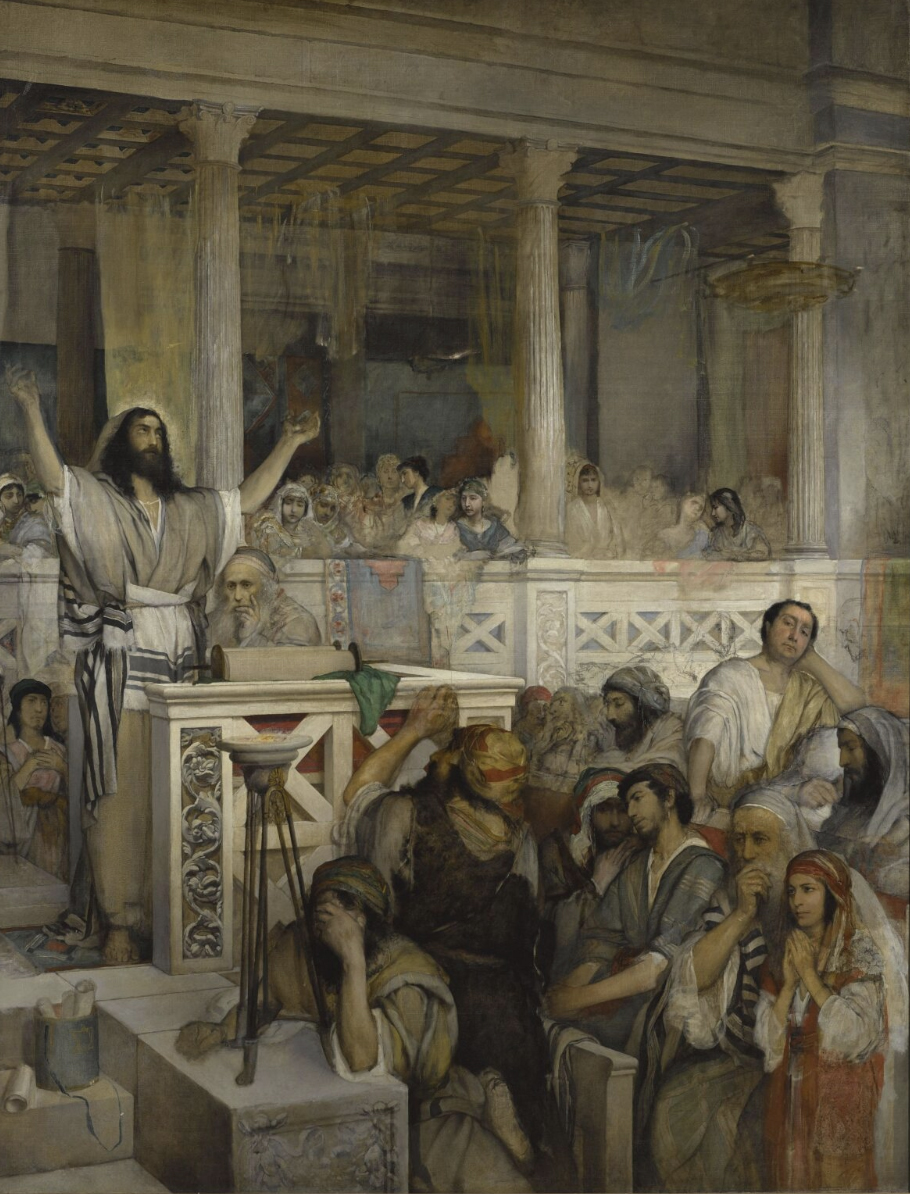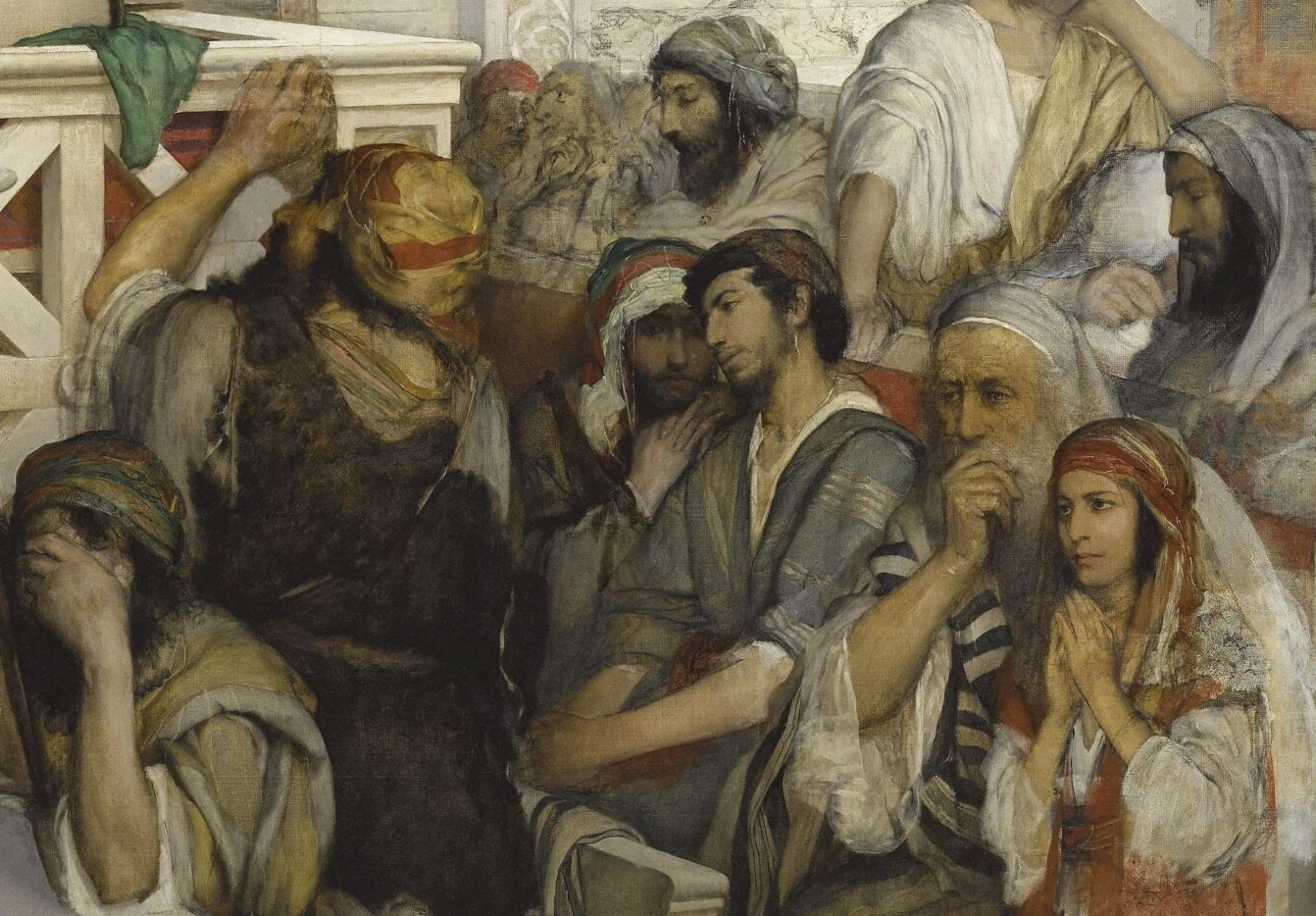And He Shall Be Called: Advent Devotionals, Week 2Sample

Advent Day 11: Rabbi | Teacher

Christ Teaching at Capernaum, Maurycy Gottlieb, 1878–79. 209 x 271.5 cm, National Museum, Warsaw, Poland. Public Domain.

Christ Teaching at Capernaum (detail), Maurycy Gottlieb, 1878–79. 209 x 271.5 cm, National Museum, Warsaw, Poland. Public Domain.
“Teach Me Your Ways” from the album Calvary Chapel Music Volume One. Performed by Fernando Ortega and Celeste Krenz, composed by John Barnett.
Poetry:
“Bartholomew: Disciple”
by Jack Ridl
I never knew what was going on.
He would say, “Let’s go,” and we
would follow. “Follow” was his word.
And we would. Fools we were to let that
take us all that way. Why we did to this day
I don’t know. Look how it ended. Look
what it became. But what did we have
to stay for? Nothing. There wasn’t much
work. Nothing much to do. There were no
stories left. Bread. Fish. So we ended up
with more bread and fish. But we did find
stories and stories. Well, what else is there?
I never did much along the way. Look it up.
In the big deal painting I’m the one who appears
rather glassy eyed, and believe me, it wasn’t the wine.
I just went along. The miracles had been done before.
I will say, though, that it was his words. Words!
Imagine. Words had never done what his did.
I’d listen, and I wasn’t much of a listener. Then
later I would try to make sense of them. I couldn’t.
But I could feel them. And maybe that was it, how
they got inside you and made you wonder and wrinkle.
They got in my brain’s garden and made it seem like
the roots were above ground and all the flowers and
vegetables, all the nourishing, were now below.
He didn’t reverse things, exactly—the first shall be
last and the last first and all that. It was that everything
changed inside me when he said those things. It was
what happened to me. I started looking at lepers and the poor
and paid no attention anymore to the kings and scribes and
Pharisees. I had thought the world of them. Now they seemed
unimportant in their importance. See? See how hard it is to
explain this stuff? You just started seeing everything with a
new mind. You began to be drawn to a whole new world,
and it was a world. Like now. A world within a world, one
drawing you, the other imposing itself on you. Why am I
telling you what you already know? Erosions. That’s it.
The reversals were erosions. And in what was left, I
wanted to plant what didn’t belong. Lilies in fields.
You might say, okay, whatever, and yet those words
did become flesh, my flesh. And my flesh, my body, held
the kingdom of God, and if it’s a place that’s a place
for children, then most of what I know really doesn’t matter.
Labor doesn’t, and money, and reason, and, well, you
go make a list. He’d get me so confused. And then we’d
head off worrying about how we would eat and where
we’d sleep. Our feet were filthy. My God, we were always
filthy. We stank. And then he’d go and point at birds or
stalks of grain, even stop and have us kneel before a flower,
and then he’d smile. That haunts me still. That smile.
And then he died. He brought out hate, not love. He had
a terrifying sense of justice. Nothing he said or did
was impossible. Maybe that was it. It was all possible.
Rabbi, Teacher
If you’ve ever done any teaching or public speaking, you will recognize the expressions on the faces in Gottlieb’s painting. These are not students who’ve drifted away into daydreams or boredom. Indeed, almost everyone seems to be attentive—but not quite the kind of attentive for which every speaker yearns.
Most have understood only too well what Jesus has said, and you can almost hear the simmer of hushed comments exchanged by neighbors. One can listen to an argument and mentally toy with the evidence or turns of phrase quite calmly—like twiddling your thumbs. But these are more than minds at work; more than mere understanding passes here. Bodies take new shape under the weight of dawning conviction. That fellow in the foreground, about to knock over the tripod, barely holds himself up. He’s massaging his temples and coddling despair. Those two rascals hissing to each other in the detail of the image are aghast but trying to play it cool. Fingers lace and lips purse. The old man next to him sits deep in wonder, contemplation rippling through decades of memory. And the woman in red has decided that the end of the teaching is too long to wait. She’s heard all she needs to start praying immediately and in earnest.
Today’s Scripture passages include a set of commands which—I’ll admit—I seldom permit to bother me. In Matthew 23, Jesus takes aim at the names and titles that his disciples have traditionally used to express and receive honor and respect. But more than the names and titles, Jesus means to lay waste to traditions and systems used to determine how and why they award attention and dignity: “but the greatest among you shall be your servant.” To this humdinger he adds further paradox: “whoever exalts himself shall be humbled, and he who humbles himself shall be exalted.”
It sounds nice, doesn’t it? In the way that the beatitudes “sound” nice. And impossible. Would it ‘twere so simple: that the macho hooligans who exalt themselves and go strutting about on the bones of the poor would be humbled, and that the humble among us were lifted to glory and exaltation. I like it, but I seldom believe it. I let myself feel irritated with students who write me emails that don’t acknowledge my graduate degrees, and too often I casually disregard those who don’t have the titles that announce worldly achievement.
Ridl's poem provides a portrait of a man who refuses to live in cognitive dissonance with his Lord’s commands. Bartholomew refuses to let anything thwart his loyalty; he allows Jesus’ words to come alive in him, shaping character and commitment independent of mere understanding: “The words…got in my brain’s garden…/ and [I] paid no attention anymore to the kings and scribes and /Pharisees. I had thought the world of them.”
To abandon “rabbi,” “father,” “teacher,” and the tones with which I speak those words, is, I think, to abandon the ways I squirm and hustle for honor in a hierarchy that rises in the world like Babel. It is to declare that the goods I enjoy come to my hand from Christ, and not from my sweat, skill, or charm. It is to declare every man and woman my brother or sister in the family of God. “Nothing he said or did / was impossible. Maybe that was it. It was all possible.”
May it be so.
Prayer:
O God the Father of our Lord Jesus Christ, our only Savior,
the Prince of Peace: Give us grace seriously to lay to heart the
great dangers we are in by our unhappy divisions; take away
all hatred and prejudice, and whatever else may hinder us
from godly union and concord; that, as there is but one Body
and one Spirit, one hope of our calling, one Lord, one Faith,
one Baptism, one God and Father of us all, so we may be all
of one heart and of one soul, united in one holy bond of truth
and peace, of faith and charity, and may with one mind and
one mouth glorify thee; through Jesus Christ our Lord.
Amen.
- From the Book of Common Prayer
Dr. Phillip Aijian
Adjunct Professor
Torrey Honors College
Biola University
Scripture
About this Plan

Biola University's Center for Christianity, Culture & the Arts is pleased to share the annual Advent Project, a daily devotional series celebrating the beauty and meaning of the Advent season through art, music, poetry, prayer, Scripture, and written devotions. The project starts on the first day of Advent and continues through Epiphany. Our goal is to help individuals quiet their hearts and enter into a daily routine of worship and reflection during this meaningful but often hectic season. Our prayer is that the project will help ground you in the unsurpassable beauty, mystery, and miracle of the Word made flesh.
More
We would like to thank Biola University for providing this plan. For more information, please visit: https://ccca.biola.edu/advent/2025









